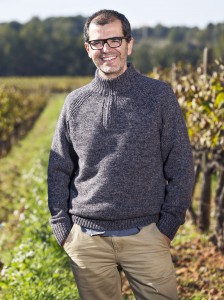
The other week Ton Mata was in town to show some new wines from Celler Credo and to reinforce the message that the Recaredo sparkling wines had seceded from the generic Cava DO. Both Recaredo and Celler Credo are dedicated to making wines that show the very best of their region.
For almost a century, Recaredo has maintained a firm commitment: to produce terroir wines that reflect the landscapes of the Alt Penedès as honestly and transparently as possible. They make only vintage brut nature with a distinctive character marked by long ageing, and over the last few years, have embarked on a project to make still wines that truly reflect the particularity of Xarel.lo (especially) on different soils and made in different way.
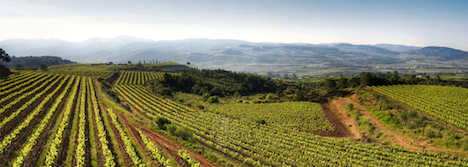
Recaredo seek to ensure the natural balance of the vine in the vineyard, aiming to achieve the best expression of every individual vintage. Therefore, the viticulture is based on dry farming with grapes harvested by hand. They prioritise respect for biodiversity and the environment by cultivating vines without using herbicides or insecticides and only employing natural organic fertilisers. When ripening begins, the grapes are analysed vine by vine, plot by plot, the goal being to harvest the grapes at their optimum point of ripening, to obtain the most balanced musts and the very finest wines. The entire harvesting process is carried out by hand, since it is only in this way that proper care for the grape until pressing can be guaranteed and premature oxidation (a characteristic of so many cheap cavas) can be avoided. All these vines are close to the cellars and transportation of the grapes is carried out using small trailers. The grape must is obtained by gently pressing the grapes, thereby obtaining the highest-quality part of the must. Debourbage follows and then the first fermentation where the yeasts transform the sugars to produce the base wine. Over the winter, the wine remains in contact with its finest lees, giving it volume and body and becomes naturally clarified. The grape juice from the oldest Xarel·lo vines ferment in oak barrels yielding structure and greater complexity for longer-aged cavas. Some of the base wine is aged in oak barrels for some months. This wine will be used to add greater finesse and structure to the final blending.
They make only vintage brut nature cavas with a distinctive character marked by long ageing, and over the last few years, have embarked on a project to make still wines that truly reflect the particularity of Xarel.lo (especially) on different soils and made in different way.
The secondary fermentation occurs in the bottle, with the yeasts transforming the sugar to produce the cava’s bubbles and foam. The subsequent interaction of the yeasts or the lees and the wine during the in-bottle ageing will give more complex flavours and aromas. The riddling process, a gentle, precise daily movement, always carried out by hand in the classic, traditional racks, allows the lees to descend to the bottle’s cork and prepares the bottle for the expulsion of the lees.
Manual disgorgement at the naturally cool temperature of the cellars
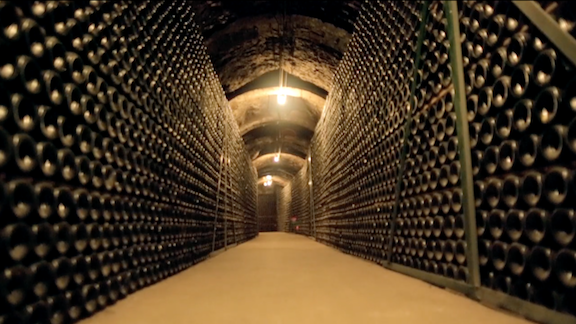
With the kind of skill that comes only from experience, the disgorger releases the lees at the natural temperature of the cellars, without freezing the neck of the bottle. Without exception, every bottle of sparkling wine produced by Recaredo is disgorged by hand in a ritual marked by rhythmic fizzing pops. Disgorgement is the final step before bottles are corked. Today, Recaredo’s winemaking professionals are keeping alive this craft, which is an exercise in skilled professionalism and respect for the environment.
The Land
The hillsides around the Bitlles River are home to a mosaic of vineyards, a total of 50 hectares in the easternmost part of the Penedès region. The Bitlles runs through a terrain broken by ravines, forests and hills. The mainly calcareous terrain is characterised by disjointed landscapes, dominated by the imposing presence of the mountain of Montserrat.
The production volumes obtained from these soils are quite low, but of high quality. The soils are loamy: a balanced mix of sands and clays that facilitates drainage when there’s heavy rain and water retention during periods of drought. Those of Turo d’en Mota, for example, have a very low percentage of organic matter and a high active lime content – the vines here being pure Xarel.lo, planted in 1940.
Biodynamics has become an essential part of the discovering the true identity of the vineyard and Recaredo’s mission is to maintain the constant pursuit of balance in the ecosystem, and a respect for biodiversity. As they say: “To move forward, we take a few steps back, observing and listening to nature to find answers. Without chemical fertilisers, without herbicides, without fungicides – only elements of natural origin. Because there can be no wines that capture the essence of the landscape unless we care for and respect the land itself.”
They treat the vines with medicinal plants, use extracts made mainly from horsetail, nettles and chamomile, whilst infusions, decoctions and macerations are applied to control the presence of mould and strengthen the vine’s natural defences. Vegetation cover is allowed to grow spontaneously between the vines, loosening the soil, regulating water retention and drainage (very important in the dry farming system), and fostering biodiversity of the vineyard ecosystem. The cover is also a perfect ally in efforts to prevent soil erosion.
Corpinnat
Recaredo is now a member of Corpinnat, an organisation comprising nine leading wineries in the region, set up with the aim of distinguishing great sparkling wines made in the heart of the Penedès from 100% organic grapes harvested by hand and entirely vinified on the premises of the winery.
Climate, soil and traditional Corpinnat territory grape varieties confer these sparkling wines an ageing capacity in the bottle which will always be longer than 18 months. Likewise, making a sparkling wine aged for more than 30 and another for more than 60 months is proof of the commitment of Corpinnat wineries with long ageing.
The word itself comprises two concepts: COR, the cradle where, more than 130 years ago, the very first sparkling wines in Spain were made and PINNAT which stems from the etymological root Pinnae which refers to the origin of the word Penedés, documented in the 10th Century as Penetense. This Latin adjective is derived from pinna, which means crag or rock and which applied to the Penedés is equivalent to rocky soil. So, whatever you do, don’t think corporate, as this word is emblematic of terroir and tradition.
The Celler Credo wines
The Mediterranean variety Xarel·lo is the leitmotif of Celler Credo’s wine project and the thematic thread that gives rise to their wines. “Aged on the lees, macerated with the grape skin or stems, with no sulphites added – made today using techniques they learned from our grandparents yesterday… In short, a thousand and one ways of interpreting Xarel•lo. In other words, Xarel·lo is our credo.”
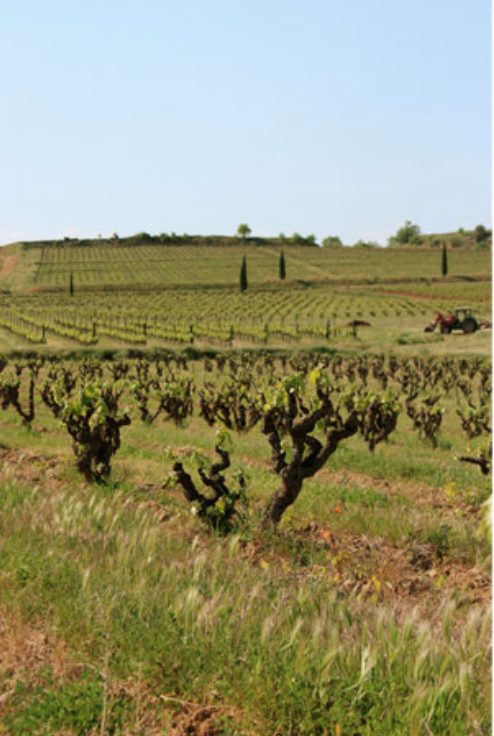
Celler Credo is committed to making terroir white wines – without chemical fertilisers, pesticides or herbicides. As they say: “…wines that speak plainly, recounting a sensory history that’s free of artifice, authentic. This is a dialogue between man, the variety and the land; a conversation in which there’s much to say and nothing to hide”.
Miranius, named after a clever fox who ventures into the vineyards and is delighted by the sweet aromas of the grapes, is made exclusively with grapes from vineyards owned by Celler Credo in Alt Penedès. All the vineyards have been cultivated in accordance with the principles of organic, biodynamic agriculture with plant cover encouraged to grow spontaneously between the vines. This cover plays a crucial role, loosening the soil, regulating water retention and drainage (essential in the dry farming system they practise), and helping to foster biodiversity and maintain a balance in the vineyard ecosystem. Natural treatments based on medicinal plants (phytotherapy) are applied to the vines to control the presence of fungus and strengthen the vine’s defences in a natural way. Miranius itself is a lively young wine that is very vibrant and ages well in the bottle, made 100% from Xarel·lo with strong varietal character of yellow fruits, crisp acidity and a fine chalky palate.
Aloers was the name given to farmers in the Middle Ages who owned the land that they cultivated. They were free of any duty to pay rent or render service. The white wine Aloers is made exclusively with grapes from La Pedra Blanca family-owned vineyards. The must macerates for a few hours with the stems in this wine which is then left on the lees for approximately one month and a half. This is the freshest, most genuine expression of the Mediterranean Xarel·lo grown on calcareous soils. The wine is light-medium bodied with great vivacity and apple-rind and citrus flavours, but also ages very well.
A new wine, La Volaina is the result of an initiative launched by Celler Credo together with Museo de Ciencias Naturales de Granollers with the aim of researching and sharing the importance of butterflies (Volainas). For this, the Parellada variety is grown in fully ecological vineyards in the town of Pla de Manlleu, one of the highest altitude areas of the Penedès region (500 metres above sea level). The harvest is carried out manually and transported in small boxes. La Volaina is a low-alcohol white wine with great aromatic intensity.
Ratpenat (the Catalan word for “bat”) grew out of an agreement between Celler Credo and the Granollers Natural Science Museum to work together to defend the environment and the creatures that inhabit it. 60 % of the profit from sale of this wine goes to support projects aimed at raising public awareness of the importance of bats in the ecosystem and at conserving its habitat in the vineyard, where it plays a valuable role as an efficient insectivore. The wine itself is 100% Macabeu on schist soils. Ratpenat is fermented in oak cask, after which the wine stays in the cask for about a one and a half months. The schistous character is stamped throughout the wine with its powerful minerality and intense mouthfeel. Golden yellow fruits, wild herbs and bleached stones.
Capficat comes from a vineyard called Serral del Bosc planted in 1940 – a mainly calcareous terrain characterised by a loamy soil texture (balanced mix of sands, silts and clays). Fermented and aged briefly in used oak barrels there is more mouthfeel in this wine, more herbs and dry spice on top of the apricot-skin fruit. No sulphur is added at all.
Estrany is yet another interpretation of Xarel.lo, being macerated with grape skins (although no stems) for ten days. This contact with the skin is taken to the limit to showcase the Xarel·lo variety in a frank, uncompromising way that captures all its depth and rough-edged elegance. An amazing wine with layers of pulped fruit including the skins, minerals and herbs and a really long vinous finish.
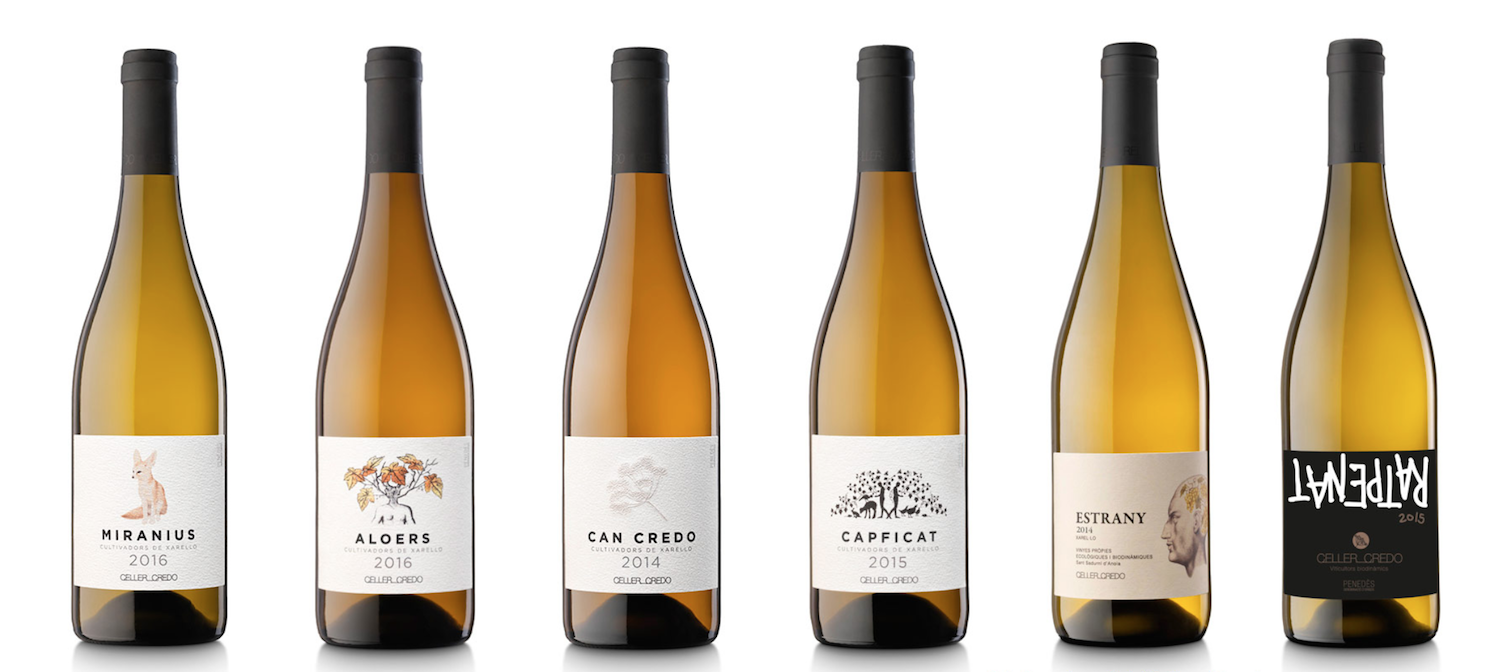
We currently have in stock the following Celler Credo wines:
2018 Miranius
2018 Aloers
2015 Capficat
2014 Estrany
*
Interested in finding more about the wines of Celler Credo / Recaredo? Contact us directly:
shop@lescaves.co.uk | sales@lescaves.co.uk | 01483 538820

